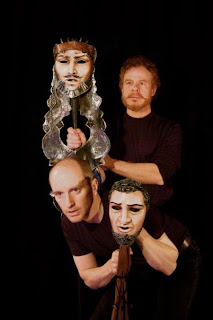 |
| Michael Bertolini as Agamemnon Lynn Berg as the Servant |
In my version, I bring the prologue to the top of the show, where I believe it began. This did create a few logistical problems. The first line(s) of the prologue are lost, and I needed to tie together the Servant's question and the next portion of the dialogue. The latter section was a little tricky, but I accomplished it by preserving a few lines of the prologue in the scene, and then played a little with the wording of my translation to make it flow more smoothly. And for the opening words...I added three. "I am Agamemnon." Thus do I improve on Euripides.
Here is the prologue, for those interested:
I am Agamemnon. My wife Klytemnestra was one of three daughters born to Leda, daughter of Thestius, the other two being Phoebe and Helen. As Helen was the most beautiful of the three, she had every young man of any distinction in Achaea vying for her hand. The competition frequently became so violent that some of her suitors came close to murdering each other. Helen’s father wasn’t sure how he could choose a suitor, and he began to wonder whether he should marry her off at all. Finally, a solution came to him. He made all of Helen’s suitors take an unbreakable oath. They joined hands, poured offerings of wine, and burned a sacrifice. “Whoever wins Helen as his wife,” they swore, “will have our allegiance. Should any man try to steal Helen away from her husband, we will all join as one to chase him down, whoever he is, whether Achaean or foreign, and we will make war upon his city until it is burned to the ground.” Once Helen’s father had cleverly engineered this oath, he told his daughter to go wherever love’s sweet breath might lead. It led her to my brother, Menelaus, though I dearly wish it hadn’t.
After some time, a Trojan man named Paris arrived in Sparta. It was said that Paris had once judged a beauty contest in which Aphrodite herself had taken part. He was dressed in elaborate barbarian robes, covered with jewels and flowers. He declared his love for Helen. She declared her love for him. So, while Menelaus was occupied elsewhere, Paris stole away with Helen, bringing her to Troy. Menelaus was beside himself in fury. He roared through Achaea and demanded that all of Helen’s onetime suitors should remember their oath and help him hunt down Paris. Soon all of Achaea was in arms.
And now here we are at the straits of Aulis, with our ships, our troops, our horses, and our armaments. Because Menelaus is my brother, I have been given the honor of being the general. It is an honor I would gladly give away, if I could.
But we cannot move from here. The wind thwarts us. We cannot sail. In despair, we turned to Kalchas, a great prophet, who told us there is only one hope, if we wished to ever leave this place. My daughter, Iphigenia, must be sacrificed to Artemis. Then, and only then, he said, would the wind blow us in the direction of Troy, which would fall beneath our might.
“Sound the trumpet,” I told my herald. “Our war is done. I will not kill my daughter.” But my brother overwhelmed me with his pleas and his demands until I agreed to commit this horror, this unspeakable act. I sent a message to my wife. It told her to bring our daughter here to Aulis. I wrote that Iphigenia would be wed to Achilles, our greatest soldier. I wrote that Achilles would not sail with us unless he was married to my own daughter, unless he could one day go home to her.It was a lie, a fake marriage, a base trick. Only Kalchas, Odysseus, Menelaus, and I know the truth. And now I realize that I have made a grave error, an error that must immediately be remedied.




No comments:
Post a Comment